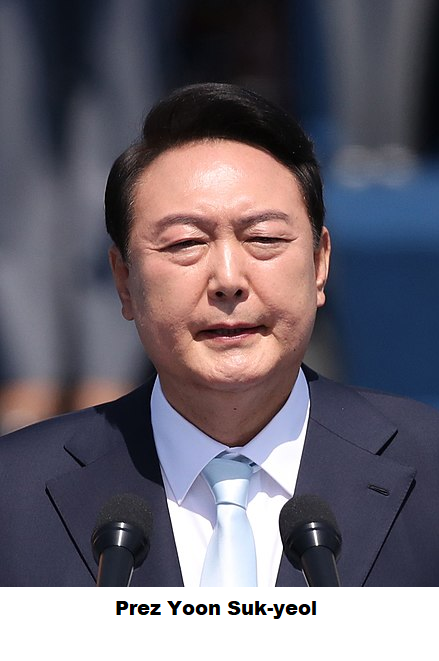South Korea looks to break China import dependence and establish ‘supply chain alliances’

South Korea is gearing up to reduce trade dependence on China and build up new supply chain alliances to meet the post-Covid challenges.
The pandemic restrictions and protocols in China have disrupted the supply chain which is mostly China based.
 Under President Yoon Suk-yeol’s new conservative administration – which is seen as more hawkish towards China, South Korea is looking to forge closer ties with a range of economies in the Indo-Pacific, the Star reported.
Under President Yoon Suk-yeol’s new conservative administration – which is seen as more hawkish towards China, South Korea is looking to forge closer ties with a range of economies in the Indo-Pacific, the Star reported.
In the first three quarters of last year, 3,941 out of 12,586 items that South Korea imported had a minimum 80 per cent dependency on a particular country, data from the Korea International Trade Association showed. Some 1,850 items, or almost half, had at least an 80 per cent dependency on China.
Hence the new urge to diversify imports, and create supply chain alliances, a high-level presidential aide was quoted as saying in local dispatches.
“The government will manage the supply chain, which is core to the idea of economic security,” according to the report
Securing supply chains for critical goods and materials has emerged as a priority for many countries following the coronavirus pandemic and amid heightened tensions between China and the United States. But data shows South Korea has a long way to go, added the report in The Star.
South Korea’s imports from China are laargely electrical and electronic equipment including unfinished semiconductors. Semi-finished chips worth US$17.93 billion were imported in 2020, accounting 39.5 per cent of the total value of imported semiconductors. Media rports add that South Korea relies on China for rare earths – a key component for electric vehicle batteries, of which Korea is a top five global producer.
Some other countries, notably, Germany, Japan, India and the US are also seeking to reduce their dependence on the Chinese supply chain particularly rare earth imports
South Korea is said to be planning to join the 11-nation Comprehensive and Progressive Agreement for Trans-Pacific Partnership (CPTPP), whose signatories span economies in North and South America, as well as countries in the Asia-Pacific.
The Brookings Institution estimates that South Korea could gain US$86 billion annually by joining the trade bloc, as it would boost the country’s role “in Asian and North American supply chains by lowering tariffs and non-tariff barriers with economies such as Japan, Malaysia, Mexico and Vietnam”.
South Korea will also become a member of the Regional Comprehensive Economic Partnership (RCEP), which is the world’s largest trade bloc, with 15 Asen and non-Asean nations. (SAT)
-
Book Shelf
-
 Book Review
DESTINY OF A DYSFUNCTIONAL NUCLEAR STATE
Book Review
DESTINY OF A DYSFUNCTIONAL NUCLEAR STATE
- Book ReviewChina FO Presser Where is the fountainhead of jihad?
- Book ReviewNews Pak Syndrome bedevils Indo-Bangla ties
- Book Review Understanding Vedic Equality….: Book Review
- Book Review Buddhism Made Easy: Book Review
- Book ReviewNews Elegant Summary Of Krishnamurti’s teachings
- Book Review Review: Perspectives: The Timeless Way of Wisdom
- Book ReviewNews Rituals too a world of Rhythm
- Book Review Marx After Marxism
- Book Review John Updike’s Terrorist – a review
-
-
Recent Top Post
-
 Commentaries
Impasse over BRI Projects in Nepal
Commentaries
Impasse over BRI Projects in Nepal
-
 CommentariesNews
Yet another Musical Chairs in Kathmandu
CommentariesNews
Yet another Musical Chairs in Kathmandu
-
 CommentariesTop Story
Spurt in Anti-India Activities in Canada
CommentariesTop Story
Spurt in Anti-India Activities in Canada
-
 NewsTop Story
Nepal: Political Stability Under Threat Again
NewsTop Story
Nepal: Political Stability Under Threat Again
-
 NewsTop Story
Accountability Tryst With 2024 Ballot….
NewsTop Story
Accountability Tryst With 2024 Ballot….
-
 NewsTop Story
What Would “Total Victory” Mean in Gaza?
NewsTop Story
What Would “Total Victory” Mean in Gaza?
-
 CommentariesTop Story
The Occupation of Territory in War
CommentariesTop Story
The Occupation of Territory in War
-
 CommentariesTop Story
Pakistan: Infighting in ruling elite intensifies following shock election result
CommentariesTop Story
Pakistan: Infighting in ruling elite intensifies following shock election result
-
 CommentariesTop Story
Proforma Polls in Pakistan Today
CommentariesTop Story
Proforma Polls in Pakistan Today
-
 CommentariesTop Story
Global South Dithering Away from BRI
CommentariesTop Story
Global South Dithering Away from BRI
-
AdSense code



















